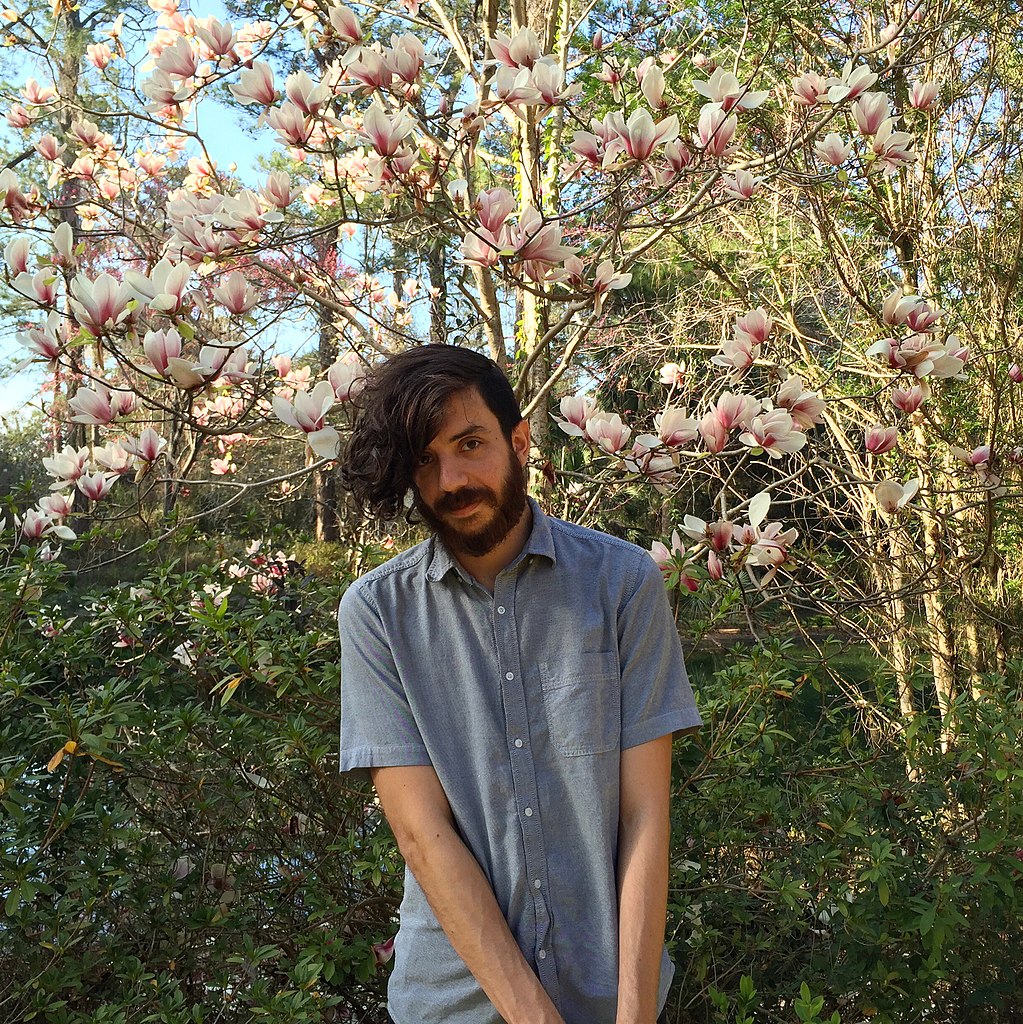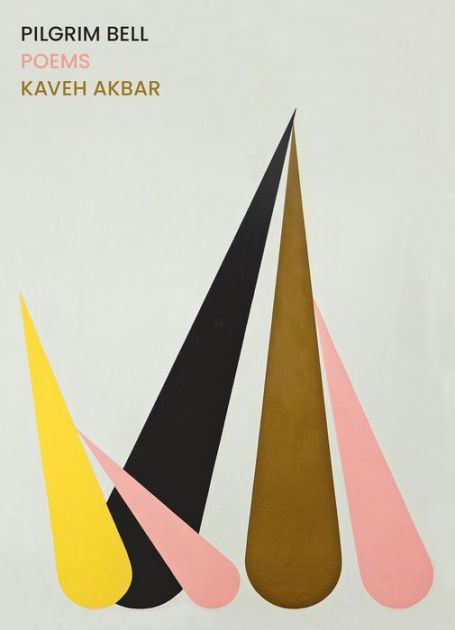Published July 25th, 2022
Review
by Seher Hashmi
Kaveh Akbar is a prominent American poet of Iranian origin who shot to fame for resorting to poetry to fight off addiction. His first pamphlet Portrait of the Alcoholic came in 2017. Calling a Wolf a Wolf (also 2017) is his debut anthology and Pilgrim Bell (2021) is his second major oeuvre. If Calling a Wolf a Wolf was the outcry of a tormented soul knee-deep into the quagmire of addiction, then Pilgrim Bell rings to announce Kaveh's quest for meaning into the sanctuary of the spiritual. However, it's not a book of devotional hymns written in absolute praise of the divine, as the impervious assertion in the epigraph, “Any text that is not a holy text is an apostasy./ Then it is a holy text” sets a skeptical tone for the entire collection.
At the outset, Kaveh declares that his journey doesn't require mindless subjugation or irrational trust: “Trust God but tie your camel.” His verse resonates with the spiritual dissonance of a modern man aspiring transcendence without letting go of faith and reason: “Trust God./The volume of your hands/But carry water.”
“There Is No Such Thing As Accident Of Spirit'' reverberates resentment with language “they sent down” which instead of facilitating impedes the perception of the divine. It is stifling “like seawater filling a lung” which is why his doubt is “turquoise / today and almond-hard. It speaks /only of what it can't see for itself." His imagery pulsates with the tension built on by the limitations of words which can't be eased up with the scrimpy vision doubt offers.
“I demand./To be forgiven.” Kaveh approaches God, reproaches Him, consents Him while resenting it, pleads with Him taking a threatening tone, and makes prayers while flouting His boundaries with a poetic rationale. “God's words is a melody I sang once then forgot.”
His curious contemplations on faith and God originate a haunting imagery which is a cross between surreal and gothic. He ruminates “living in a mosque built on top of a flagpole/ all day I hammer the distance between earth and me. Into faith.” And belief vibrates through him "the way air/ vibrates. The violence. / in your middle ear."

In “Vines” Kaveh's imagery takes on a grotesque look: “When I saw God/I trembled like a man I used wrong pronouns/God bricked up my mouthhole.” He injects quirky humor and a flooring vibe into his style, exploring themes generally considered too sanctimonious. The devil who enters Adam “crawls through his throat, through his guts/to finally emerge out his anus'' and has a hearty laugh at Adam's expense, as afterwards “he’s all hollow!”
There are six titular poems interspersing the entire anthology. “Dark on both sides./Makes a window” it’s not knowledge but the want of it that kindles the urge to question the divine. The anthology reads like a critique on the divine within the context of multiracial and multi-faith societies where lines between the origin and the resident, known and unknown, language and silence are smudged due to national politics.
“The Palace” comes last as an elegiac requiem to the American Dream that every immigrant has difficulty matching with reality. In a slow, woeful tone, it traces the cartography of immigration right from the day his father left Iran.
My father wanted to be Mick Jagger. My father
Went full ghost,
Ended up working on duck farms for thirty years
Read with the backdrop of Iranian-American politics, Kaveh's anguish resonates with tragic overtones.
At his elementary school in an American suburb,
a boy's shirt says: "We Did It To Hiroshima, We Can Do It To Tehran!"
The ache of not being able to belong — "I am always elsewhere in America” — and the disconnect with origin — “I might have said bademjan” — find a way into resentful reflections on America:
There are no doors in America
Only king-sized holes.
Lines flow on with a sluggish, plaintive rhythm in scanty words:
America the shallow breath,
How to live?
The shallow trap, America
Catching only what is too small to eat.
However, his poetic genius doesn't let his defiant spirit fizzle out into self-pity or nostalgia. And he concludes the anthology with a note of gusto peculiar to Kaveh:
America I warn you, if you invite me into your home
I will linger,
Kissing my beloveds frankly,
Pulling up radishes
And capping up all your pens.
There are no good kings,
Only burning palaces.
Lose me today, so much.
In “Vines” after incurring God’s wrath the poet atones himself, “living like a widow” only with sex toys and weaving patterns. Gradually, the desire creeps like vines on and he realizes the discipline of abstinence has robbed him of his senses to relish. An eerie pictorial simile evokes his plight:
I am like a nose
torn from a face and set in a bowl.
Kaveh's spiritual reflects a rare confluence of Islamic ideology — the faith he was born into — and many concepts of Christianity that he probably has assimilated from Americans or directly deduced from English literature that he now teaches at Purdue University.

The title Pilgrim Bell is indicative of this amalgamation of spiritual patterns evolving in the mind of a contemporary poet. What beckons him to undertake this introspection is not a call — the Islamic way to spiritual communion — but the jangle of bell.
In “The Miracle'' he acknowledges in a sad tone that “Gabriel isn't coming for you / you too full to eat. You too / locked to door.” Frustrated with disharmony sowed by language, he maintains that “even if he did, would you call him Jibril, or Gabriel like you are here?”
Here is a poet who employs Biblical diction to communicate with and castigate the divinity; quotes Rabia Al Basri and Anne Carson side by side and calls Gabriel “God of man” fearlessly. It is interesting to note that this subtle spiritual pattern, overlapping here and there, has enabled Kaveh to humanize the divine.
In “Despite My Efforts Even My Prayers Have Turned Into Threats” Kaveh is in conversation with the divinity:
Holy father I can't pretend
I'm not afraid to see you again
And before Lord, Kaveh defends his case with a girth of the creative ingenuity of a poet.
I just imagine you fed up with
All your making, like a virtuoso
Trying not to smash apart her
Flute on stage.
First, he confesses relishing in the tantalizing taste of “two peaches stolen from a bodega”. Next, he confronts Lord’s oversight of the need for assimilation in a community neither native nor familiar to his Islamic upbringing. And he questions if his earth-father's knowledge of English that was limited to lyrics of Rolling Stones will be sufficient to become an active citizen of American society: "He warns Lord to be more flexible or: / Time will break what doesn't / Bend — even time. Even you."
“Mothers I Once Was” is a tribute to the motherly traits Kaveh is proud to possess.
Mother with all of creation fattening
Mother who held on while it was happening
Apart from acknowledging the sacrificial characteristics generally attributed to mothers, Kaveh sings of the human flaws too. “Our Lady Mother of Wet Beds/ and Aggressive Disgrace.” The candid reckoning of bed-wetting and aggressive disgrace as motherly takes Kaveh's treatment of the subject few notches above mere self-deprecation. It's a sincere recognition of being human with all the wryness that the human condition lends to humor. Its sonnet-like structure gives a unique lyrical cadence which doesn't sound classical but modern as it is undercut by the anaphoric employment of the word mother. The overall effect is Kaveh's signature tongue-in-cheek tone to the underlying humor in the poem.
“Cotton Candy” is an implied metaphor emerging from Kaveh's response to a line by John Donne. “To go to heaven, we must make heaven come to us.” It stimulates an awakening of the conflicting troubles of two emigrant generations in America. His mother’s efforts as an emigrant are juxtaposed with his yearnings for simple pleasures without the cultural baggage that entails immigration.
His American mother braved being jeered at for speaking Persian in a thick accent in hometown Iran. He does register her desperate attempts at belonging. However, Kaveh isn't endorsing it at all.
a mother.
Is someone who
Is looking to improve
Mine was
A claimable trellis her nation.
His spiritual mantra revolves around here and now. “Heaven/ is all preposition — above, among, around, within.”
To him, heaven springs from self and keeps spinning around the gratification of body.
If I were a mother
I would lose my child at the fair and go in
Riding rides zooming through the
Air singing Which way I fly is
Heaven! I myself am heaven!
Pilgrim Bell records Kaveh's calibrations in a spiritual that ought to be cut out for modern life, his exploration of its peripheries with an inquisitive mind and robust imagination of a poet. It's snarky and serious, holy and humorous, and lyrical yet dissonant.
Nationality: Pakistani
First Language(s): Urdu, Punjabi
Second Language(s):
English
Supported by:


Comments on "Life, God, and the Land — A Review of "Pilgrim Bell" by Kaveh Akbar"
Please log in to submit a comment.
Login